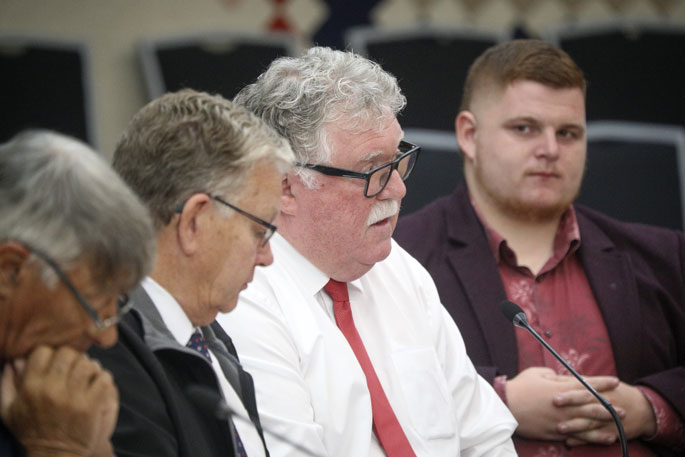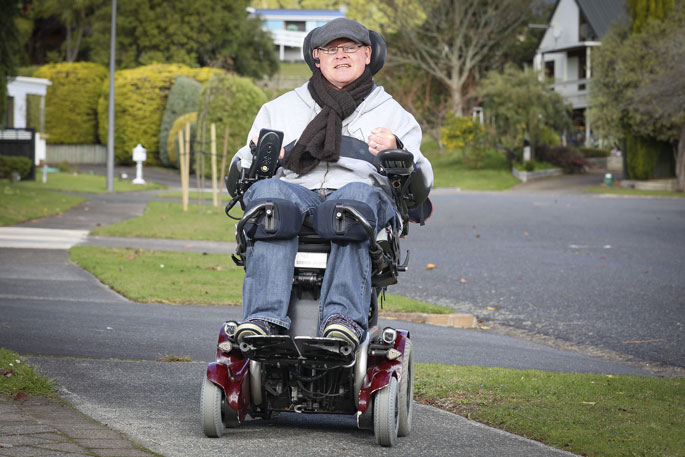Bus fares will be free for disabled people in the Bay of Plenty by July, a move a disability advocate says is 'awesome”.
The announcement, by Bay of Plenty Regional Council Regional Transport Committee chairman Lyall Thurston at a Rotorua Lakes Council committee meeting last week, was met with applause.
The scheme is expected to impact fare revenue by $139,000.
Thurston was attending the district council meeting as part of the regional council's consultation process for its 2021-2031 Long-term Plan.
"We're sitting here telling you what we're going out to consult on, I'm going to tell you something we're not going to consult on which will get you really excited,” he told the committee.
"One in five New Zealanders have a disability which impacts on their daily life and we are ... going to be rolling out free fares for mobility [impaired] and severely disabled people in this community in the foreseeable future."
On Monday, Thurston told Local Democracy Reporting the plan was to replicate a template established by the Waikato Regional Council, which made fares free for people with disabilities in 2019.
It was extended to carers at the end of 2020.
The free bus travel in Waikato was available to people with a permanent or short-term disability of longer than six months.
 Bay of Plenty Regional councillor Lyall Thurston (centre) at the Rotorua district council on Thursday last week. Photo / Andrew Warner / Rotorua Daily Post.
Bay of Plenty Regional councillor Lyall Thurston (centre) at the Rotorua district council on Thursday last week. Photo / Andrew Warner / Rotorua Daily Post.
Thurston, who is a former president of CCS Disability Action said making fares free for disabled people was 'long overdue”.
'It's exciting stuff.”
He says the change is answering a long-held call from people with disabilities, carers and parents and would allow people to better engage in their communities.
Thurston said he wanted the scheme 'rolled out yesterday”. He hoped it would be extended to carers as had been done in Waikato.
Rotorua resident Tim Lee, who uses a wheelchair, says he didn't personally use buses but says it's a 'very inclusive thing to do”.
'It's a positive step in the right direction.”
Fellow wheelchair user, CCS Disability Action access co-ordinator Max Hales says it's 'awesome”.
'It will help disabled people use public transport more and get out into the community more.”
He hopes the idea will catch on nationwide, a sentiment echoed by Midland region general manager Colene Herbert, who challenged 'all councils to do the same”.
 CCS Disability Action Midland region general manager Colene Herbert. Photo / Supplied.
CCS Disability Action Midland region general manager Colene Herbert. Photo / Supplied.
Disabled Persons Assembly chief executive Prudence Walker says her group is excited by the decision.
'We've heard from disabled people in Waikato that the free bus concessions have made a real difference to their lives. People are able to get out and visit people and do things that they would never have done before because cost was a barrier.”
She says statistics suggest disabled people are more likely to be lonely than non-disabled people, with disabled people being four times more likely to feel lonely most of the time than non-disabled people.
'Removing the cost barrier of public transport is one practical step that we can take to enable disabled people's greater participation in their community.”
Bay of Plenty Regional Council transport and urban planning manager James Llewellyn confirms people with a 'permanent mobility impairment” will be eligible for free fares on all regional council-contracted urban and inter-regional bus services.
It included anyone with a permanent mobility impairment that meant they could not drive a private vehicle, which included members of the council's Total Mobility scheme.
Total Mobility is a council programme which helps people with serious mobility constraints access subsidised door-to-door transport.
Llewellyn says the permanent mobility impairment could be physical, intellectual, psychological, sensory or neurological.
'The scheme does not include people with temporary disabilities or caregivers.”
He says the regional council is working with disability groups and agrees assessors in the lead up to July 1 to promote the concession and start the application process.
An application form was under development and once ready would be made available in hard copy and online.
He says the reduction in fare revenue is expected to be $139,000 each year.




4 comments
Very good
Posted on 16-03-2021 10:35 | By Let's get real
A cost of $139,000 a year is chicken feed. A better move from them would have been to reduce the size of the vehicles on the road at off-peak times, when some of the routes could be run with a motorbike and sidecar or a tandem bicycle. But we seem happy to continue with ten metre buses throughout the day and into the night. It would be easier to find drivers as well
Tom Ranger
Posted on 16-03-2021 12:00 | By Tom Ranger
Cheap. No worries. But I would dispute the figures used. How dishonest to say 20% of people have a disability. Then saying free fares for people with mobility issues. Is that the same 20% figure? Me thinks not. I'll predict that these people won't use the free bus regularly if at all anyway as the Rotorua resident has said. So...probably cost less than the $139,000. No big deal here. Perhaps the other bus users should pay a slightly higher rate to make the bus service pay for itself without throwing bills at people that never use the service.
Let’s get real
Posted on 16-03-2021 15:56 | By Johnney
Your are exactly right. We have 4 buses every hour with very few passengers. Could easily halve that. Downsizing the buses would also be a good start.
Tom Ranger
Posted on 17-03-2021 11:30 | By Tom Ranger
I still like Slim's idea. Put cops in the bus drivers seat. I also like Lets get reals idea. Smaller busses during off-peak. A van would likely do.
Leave a Comment
You must be logged in to make a comment.